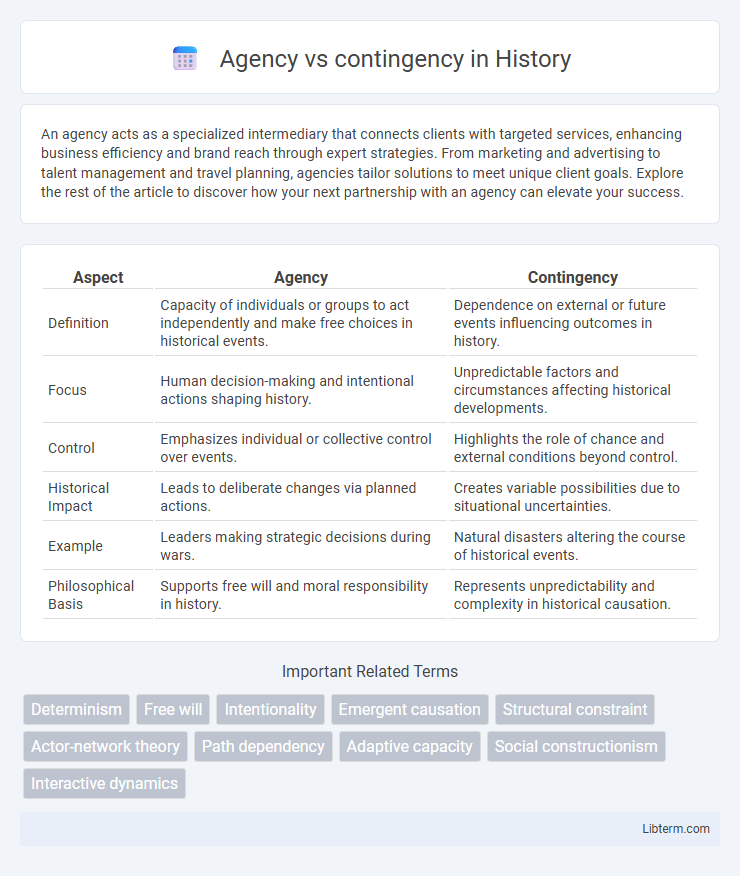An agency acts as a specialized intermediary that connects clients with targeted services, enhancing business efficiency and brand reach through expert strategies. From marketing and advertising to talent management and travel planning, agencies tailor solutions to meet unique client goals. Explore the rest of the article to discover how your next partnership with an agency can elevate your success.
Table of Comparison
| Aspect | Agency | Contingency |
|---|---|---|
| Definition | Capacity of individuals or groups to act independently and make free choices in historical events. | Dependence on external or future events influencing outcomes in history. |
| Focus | Human decision-making and intentional actions shaping history. | Unpredictable factors and circumstances affecting historical developments. |
| Control | Emphasizes individual or collective control over events. | Highlights the role of chance and external conditions beyond control. |
| Historical Impact | Leads to deliberate changes via planned actions. | Creates variable possibilities due to situational uncertainties. |
| Example | Leaders making strategic decisions during wars. | Natural disasters altering the course of historical events. |
| Philosophical Basis | Supports free will and moral responsibility in history. | Represents unpredictability and complexity in historical causation. |
Understanding Agency: Definition and Key Concepts
Agency refers to the fiduciary relationship where an agent acts on behalf of a principal, with authority to create legal obligations between the principal and third parties. Key concepts include the agent's duty of loyalty, obedience, and care, alongside the principal's obligation to compensate and indemnify the agent. Understanding agency involves recognizing the legal capacity to bind another party through authorized acts within the scope of the agency.
What is Contingency? Core Principles Explained
Contingency in agency law refers to a situation where the agent's authority to act or receive compensation depends on the occurrence of a specific event or condition. Core principles include reliance on uncertain future events, performance-based compensation, and the conditional nature of obligations between the principal and agent. This arrangement aligns interests by ensuring agents act to fulfill defined outcomes before rights or payments become effective.
Historical Perspectives: Agency and Contingency in Social Theory
Historical perspectives in social theory emphasize the dynamic interplay between agency and contingency, recognizing human actors as agents capable of purposeful action within uncertain and evolving social contexts. Classic theorists like Max Weber highlighted agency through the lens of individual intentionality, while contingency reflects the unpredictable external factors shaping social outcomes. This dual focus underscores how social structures both enable and constrain human decisions, illustrating the complex causality in societal change.
Agency vs Contingency: Key Differences
Agency vs contingency models differ primarily in payment structure and risk allocation; agency hires pay a fixed fee regardless of outcome, while contingency hires receive payment only upon successful results. Agencies offer more control and predictability, whereas contingency arrangements shift financial risk to the service provider, incentivizing performance. Understanding these distinctions helps businesses choose the best fit based on budget, risk tolerance, and desired commitment level.
Interplay Between Agency and Contingency in Human Behavior
Human behavior is shaped by the dynamic interplay between agency, the capacity for autonomous decision-making, and contingency, the influence of situational factors and external constraints. This interaction highlights that while individuals exercise personal control and intentionality, their actions are often contingent upon environmental contexts, social norms, and unpredictable events. Understanding this balance is crucial for fields such as psychology, sociology, and behavioral economics, as it explains how behavior adapts and responds to varying circumstances.
Agency in Organizational Decision-Making
Agency in organizational decision-making emphasizes the role of individuals or groups who actively influence decisions based on their expertise, authority, and strategic interests. It highlights how managers, executives, or stakeholders exercise control and accountability to shape outcomes aligned with organizational goals. Understanding agency facilitates improved governance by balancing decision autonomy with mechanisms that mitigate conflicts of interest and ensure responsible leadership.
The Role of Contingency in Strategic Planning
Contingency in strategic planning involves preparing flexible approaches to adapt to unpredictable market changes, ensuring business resilience and sustained competitive advantage. Agencies often create contingency plans that address potential risks, enabling quick decision-making and resource allocation during crises. Effective contingency planning integrates scenario analysis, risk assessment, and adaptive strategies to align organizational goals with dynamic external environments.
Case Studies: Agency and Contingency in Practice
Case studies highlighting agency versus contingency demonstrate how individual decision-making interacts with structural conditions to shape outcomes in diverse contexts, from organizational change to historical events. For example, in corporate restructuring, leaders' strategic choices (agency) often determine success, yet external market forces and regulatory environments (contingency) set critical boundaries. Empirical analysis of these cases reveals a dynamic interplay where neither agency nor contingency alone fully explains results, emphasizing their combined influence on real-world scenarios.
Implications for Leadership and Management
Agency versus contingency in leadership highlights the balance between individual decision-making and situational factors influencing outcomes. Leaders must adapt management styles by recognizing when personal initiative drives success or when external variables dictate strategies. Understanding this dynamic improves organizational agility, enhances decision-making accuracy, and fosters a responsive leadership approach that aligns with complex business environments.
Future Directions: Integrating Agency and Contingency
Future directions in integrating agency and contingency emphasize developing hybrid models that capture both intentional actions and contextual influences on behavior. Advances in cognitive science and AI focus on dynamic frameworks combining agent-driven decision-making with adaptive responses to situational contingencies, enhancing predictive accuracy. Emerging research prioritizes real-time data integration and machine learning algorithms to bridge the gap between agency's proactive control and contingency's reactive adjustments.
Agency Infographic

 libterm.com
libterm.com